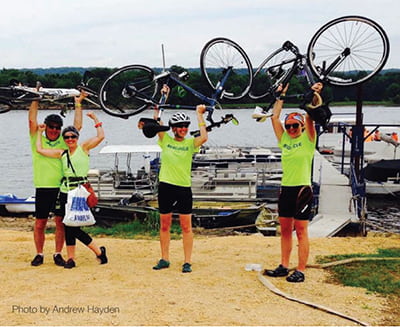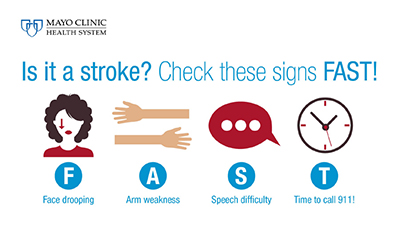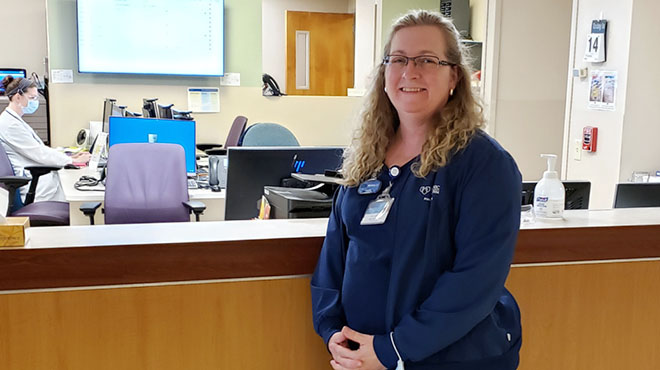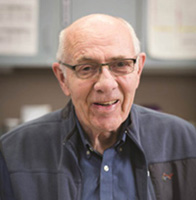Recent Posts
-
 Patient StoriesA lifesaver saved: An EMS veteran’s journey from rescue to recoveryNovember 14, 2025
Patient StoriesA lifesaver saved: An EMS veteran’s journey from rescue to recoveryNovember 14, 2025 -

-

Mayo Clinic staff experiences collaborative care firsthand after stroke

It was the week after The Register’s Annual Great Bike Ride Across Iowa in August 2014, and Dave Berg, chief administrative officer of Mayo Clinic Health System in Faribault and Owatonna, was feeling great after completing the seven-day, 430 mile-bike ride from one side of Iowa to the other.
“I had been working out a lot and feeling really good about my physical health,” says Berg. “My colleagues and I had just completed an important presentation in Rochester. It went well, and we decided to celebrate by getting sandwiches to eat on the way home.”
At the sandwich shop, Berg noticed something odd. His voice sounded slurred. “I didn’t think any more of it other than, ‘That’s weird. I wonder if anyone else can hear it,’ ” he says. But the slurred speech continued through the drive home.
That night, while checking the air pressure on his daughter’s tires, he had difficulty standing up. His daughter and wife confirmed that his voice sounded funny and they urged him to call the Nurse Line, a 24/7 medical advice line staffed by registered nurses.
“The nurse was awesome and very much to the point. She essentially said I needed to go to the Emergency Department immediately,” says Berg. “My wife drove me to Allina Hospital in Owatonna where I was glad to see Skip Powell, a Mayo Clinic Health System Owatonna doctor.” Skip Powell, M.D., performed a basic examination and, after a CT scan, cleared Berg to go home. “Dr. Powell then informed me that the night call radiologist read the CT again and noticed a dark spot that’s easy to overlook,” says Berg.
Berg’s providers referred him to the Emergency Department at Mayo Clinic Hospital - Rochester, Saint Marys Campus, where he received an MRI.
The scan revealed that Berg, at age 55, and in seemingly good health, had experienced a stroke.
“At that point I couldn’t move my right leg and couldn’t write my name, and my speech was messed up,” he says. “I had an ischemic stroke, which my physicians described as a very small stroke ‘in high-end real estate’ in my brain.” In an ischemic stroke, a blood clot lodges in a cerebral artery, which is often caused by plaque buildup in damaged arteries.
“The doctors and nurses were great throughout the whole process of recovery,” says Berg. “They took really good care of me. The physicians, nurse practitioner, occupational therapist, physical therapist, the psychologist and the nursing staff were nothing short of awesome. I really had a high-performing team caring for me. They would come into my hospital room, as a team, and discuss the care with me — challenge each other and me. The team was extended to my hometown team as I transitioned home and eventually to work.”
During Berg’s 14-day stay, he underwent many types of rehabilitation, including speech therapy, physical therapy, recreational therapy, occupational therapy and psychological evaluations. “Mayo Clinic has a great system with multiple providers to take care of me,” he says. “It was an excellent experience.”
Once home, Berg saw a family medicine physician in Owatonna, for his follow-up care. “He worked with me, coordinated with the neurologist and exchanged notes with Mayo Clinic providers to modify my medication, and really helped me fully recover while transitioning my care back to the local clinic,” he says.
A nurse practitioner called Berg once a month in his first year of recovery to confirm that he was taking his medication, monitor his blood pressure and make sure that he was improving.
“All in all, it was an amazing team of Mayo Clinic and Mayo Clinic Health System providers who worked together to help me recover. From the handoff from a board-certified Emergency Medicine doctor in Owatonna to another in Rochester, caring for me through Neurology and Rehabilitation in Rochester and back into the community,” says Berg.
“I’ve been treated for high blood pressure for a long time,” Berg says. “But I was feeling bulletproof and I had just ridden a bike across Iowa. A week later I was as sick as I’d ever been. Now my health is always on my mind — I’m always thinking, ‘Am I as good once as I ever was?’ ”
Berg is doing much better now but follows a healthy diet and exercises regularly.
“Take care of yourself,” he says. “If you have high blood pressure, treat it. Don’t delay your care, and take responsibility for your health and fitness. If you wait until tomorrow, it might be too late. Figure out what’s important to you, write it down and get after it.”



